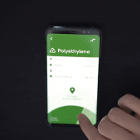
2019
master

Caio Breda, Daniel Taipina, and Maximilian Rubin created a prototype application that informs about the recycling efficienty of products. It scans the recycling codes on the products and compares two or more products.
2019
master

Laura Graça, Carolina Batista, Sara Costa created a prototype application to promote using less plastic while shopping.
2019
master
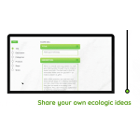
Carolina Carvalho, Sara Mendes, and Laudelino Tavares created a prototype website to find and share sustainable DIY ideas.
2019
master
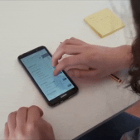
Marisa Espinheira, Marta Viana, and Rita Nóbrega created a prototype application to promote more sustainable shopping habits.
2019
master

Eduarda Duarte and Yusleivy Vivas created a prototype application to promote changing our habits about sustainable practices.
2019
master

André Santos and Hanna Filatava created a prototype application to help buyers understand the ecologicalness of the packaging of the products they are buying. Users can just scan the barcode of the product with the app and get all the info about the sustainability of the product.
2018
master
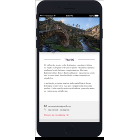
Joana Maia, Mariana Veríssimo, and Sara Silva created a prototype application to explore the region of Piodão.
2018
master
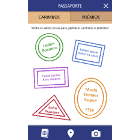
Ana Raquel Machado, Mariana Santos, and Solange Santos created a prototype application to encourage exploration of the city of Coimbra.
2018
master
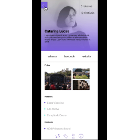
Ana Carina Correia, Catarina Lucas Loureiro, and Daniela Gonçalves created a prototype application to explore the summer music festivals.
2018
master
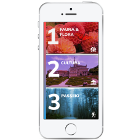
Joana Fernandes, Marco Mendes, and Susana Parreira created a prototype application to support a visit to the Portuguese Bussaco National Forest.
2018
master
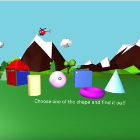
Maggie and Manyee created a prototype of an interactive VR world for teaching children about objects’ shapes. They combined external 3D objects with A-Frame’s primitives and lots of interactions and particle systems to create a visually rich environment.
2018
master
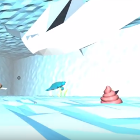
Jason and Victoria imagined what could be behind a toilet! :P They created an imaginary world where creatures live beyond the toilet pipes. Beautiful use of A-Frame primitives and of the Ocean component.
2018
master
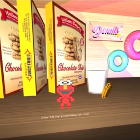
Alvira and Peggy created an imaginary shelf world, inspired in a grocery store. They produced some 3D objects in Magica Voxel and used A-Frame primitives beatifully to create the shelves, a glass of milk, cookie boxes, etc. They also used a particle system with custom textures.
2017
undergrad
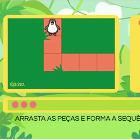
A game-like application for kids to learn to code, by Joana Fernandes, Solange Santos, Susana Parreira.
For the Multimedia course of the Design and Multimedia program at FCTUC, Coimbra.
2017
undergrad
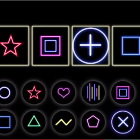
A cross-device application for making music collaboratively, by Inês Oliveira, Mariana Silva, Tânia Couto.
For the Multimedia course of the Design and Multimedia program at FCTUC, Coimbra.
2017
undergrad

Web-based RPG Game, by João Anjos, Ivo Amaro, Juan León.
For the Multimedia course of the Design and Multimedia program at FCTUC, Coimbra.
2017
undergrad
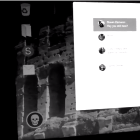
A detective game to find a missing person, by Cátia Fins Rei, Mariana Santos, Raquel Ramalheiro.
For the Multimedia course of the Design and Multimedia program at FCTUC, Coimbra.
2017
undergrad
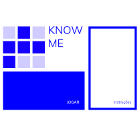
A website/application to get to know the DEI department a little better, by Joana Maia, Mariana Veríssimo, Sara Silva.
For the Multimedia course of the Design and Multimedia program at FCTUC, Coimbra.
2017
master
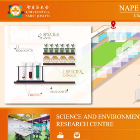
An interactive infographic depicting the NAPE 1 campus of the University of Saint Joseph in Macau, by Sandra Ng. Made with SVG, HTML, CSS, and JavaScript.
For the Infographics and Multimedia Design course of the Master in Communication and Media, USJ, Macau.
2017
master
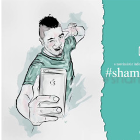
An interactive infographic about Selfies, by Reuben Rivero. Made with SVG, HTML, CSS, and JavaScript.
For the Infographics and Multimedia Design course of the Master in Communication and Media, USJ, Macau.
2017
master
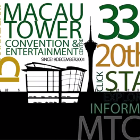
An interactive infographic about Macau Tower Convention and Entertainment Centre, by Katy Lai. Made with SVG, HTML, CSS, and JavaScript.
For the Infographics and Multimedia Design course of the Master in Communication and Media, USJ, Macau.
2015
undergrad
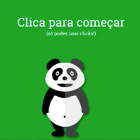
An interactive website raising awareness for the endangered Panda, by Júlia Russo, Mariana Mugeiro, Marta Vasconcelos.
For the Multimedia course of the Design and Multimedia program at FCTUC, Coimbra.
2015
undergrad

A quizz game, by Ana Cruz, Beatriz Lacerda, Joana Souto.
For the Multimedia course of the Design and Multimedia program at FCTUC, Coimbra.
2015
undergrad
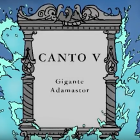
An interactive application in the form of a vertical scroller based on the Adamastor episode, by Maria Silva, Ana Ferro, Beatriz Marques.
For the Multimedia course of the Design and Multimedia program at FCTUC, Coimbra.
2015
undergrad

A tablet application for kids to discover the seasons of the year, by Gabriela Miguel, Érica Costa, Rúben Silva.
For the Multimedia course of the Design and Multimedia program at FCTUC, Coimbra.
2014
postgrad
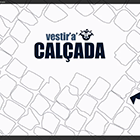
In the Generative Design class of the Digital Design postgraduate program, Mário Campos created a tool to be used by customers to personalize their t-shirt with graphics inspired in the Portuguese “Calçada” …
2014
master
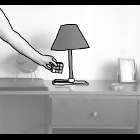
Developed by Rita Gradim, Cubesic is a tangible interface for creating musical playlists from your iTunes library. It uses a Rubik’s cube and computer vision to create a playlist based on the color pattern of the cube’s face. Developed in the Tangible Interfaces course of the 1st year of the Sound and Image master.
2014
master
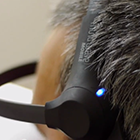
What if brain-computer interfaces where mainstream devices used daily, how could we adapt webpages to this new input? This was the question posed by Eduardo, which he answered with braistorming sessions and proof-of-concept web applications…
2013
postgrad
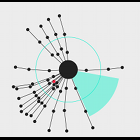
Developed by Gisela Nunes, oxHIT is a generative art project that combines audio and visuals. The audio is generated via MIDI and the interaction can be accomplished through a multi-touch table. Developed for the Generative Design course of the Digital Design degree of the School of Arts.
2013
undergrad
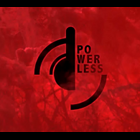
Powerless is an interactive installation by Bernardo Braga, Bruno Santos, and Rita Gradim that puts the visitor in a fearfull and stressfull Saw-like situation. Visitors are faced with three questions that they have to answer in order to be able to exit. Failing one question triggers a penalty…
2013
undergrad
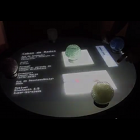
Obsoletum is an interactive installation by Armando Freitas, Guilherme Mesquita, and Nuno Meneses that provides a future museum like experience. It uses a multitouch table capable of recognizing the objects that are put on top. Visitors pick up an object, put it on top of the table and listen to the history of the object, told by a sarcastic computer.
2013
master
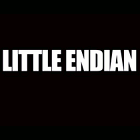
Developed by João Almeida and José Henriques, Little Endian is prototype system for interacting with a digital audio workstation through the user’s position in a room and gestures. It uses a Vicon Motion Capture system to determine the user’s position and gestures and sends Midi commands to ProTools.
2010
undergrad

Developed by Jorge Coutinho, Pom is an interactive installation inspired by Pong (Atari, Inc. , 1972). The original purpose and rules were maintained - avoid missing the ball for points - but the gameplay has been improved. Pom can be played by up to six players using smartphones!
2007
undergrad
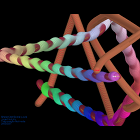
Developed by Jorge Coutinho, SDSL is an interactive video installation that uses the DiABlu System to detect presence. The project was implemented using Processing, as a project for the Multimedia Programming class. Basically, it represents people (their Bluetooth devices) as spheres on a screen. These spheres are all attracted to another special sphere: Dot.
2006
undergrad

Developed by João Cordeiro, Nulltidão is an interactive video installation that uses the DiABlu System to detect presence and remove parts of a live image depending on the number of present Bluetooth devices. The project was implemented using Processing, as a project for the Multimedia Programming class.
2005
undergrad
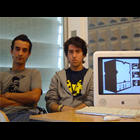
Picture from UP journal. Developed by Daniel Santos and João Rêma, X-Fetch is a city-wide peddy-paper-like game, where players have to discover a set of clues spread across the city (Porto) using a mobile device that plays videos pointing to next clues and that tracks players GPS locations.